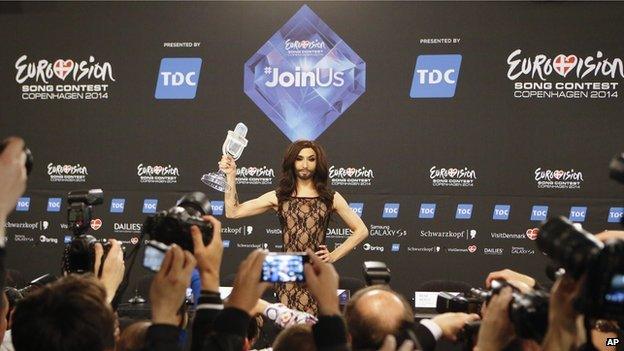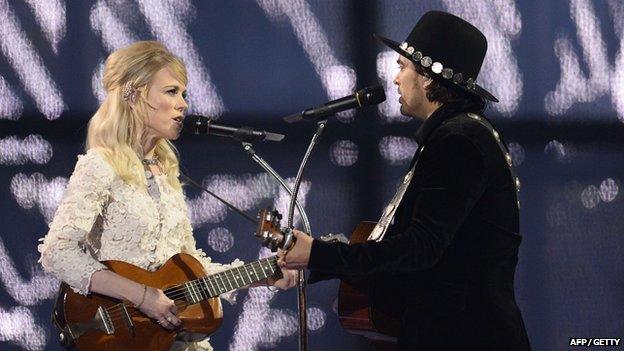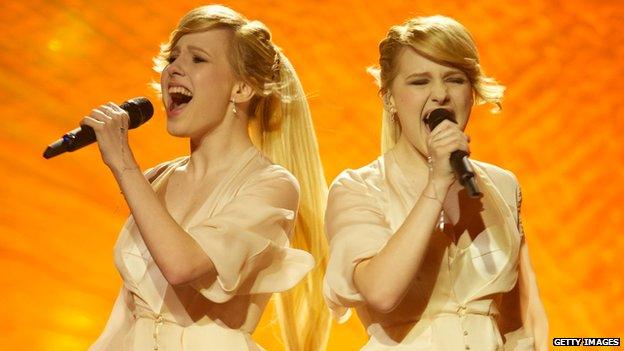Eurovision 2014: A night of surprises as Conchita wins
- Published
Austria's Conchita Wurst: "This night is dedicated to everyone who believes in a future of peace and freedom"
It could have been easy to write Conchita Wurst off as a gimmick - a Eurovision novelty act known as "the bearded lady".
However when she stepped onto the stage in Copenhagen on Saturday night, it soon became clear she had both the crowd and the television audience captivated with her epic track Rise Like A Phoenix and a voice to match.
Twitter was instantly full of demands that she sing the next Bond theme, or claims that the competition was over, we could all go home. Former favourites Sweden and Armenia were edged out of the running.
Her performance in Thursday's semi-final - which we now know she won - had a similar effect, repositioning the drag act as a serious contender for this year's Eurovision crown.
'Respect and tolerance'
The momentum behind Conchita's message of acceptance had begun more than a month earlier though, with fans around the world knitting beards to show their support as a "symbol of tolerance".
In interviews she spoke about wanting to show people "that you can achieve anything" by just being yourself "and believing in yourself".
Being awarded 12 points by a dozen countries and winning the Eurovision Song Contest will surely tick that box.
"I felt like tonight Europe showed that we are a community of respect and tolerance," said Conchita during the winner's press conference.

All eyes were on Conchita after she won the glass microphone trophy at this year's Eurovision Song Contest
However, some Eurovision fans have argued that while it is definitely a win for tolerance, the character Conchita Wurst - created by Austrian singer Tom Neuwirth - could be just gimmicky enough to damage its credibility as a song contest.
"It confirms the idea that this is not a musical contest, it's a television contest," said journalist and Eurovision fan Dave Goodman.
"However the triumph of The Netherlands in second place is a massive boost to the musicality of Eurovision," he added.
"To say a song that's quiet, very well written but not 'boom-bang-a-bang' or gimmicky at all can come second is very, very reassuring."
Dutch country duo The Common Linnets appeared to come from nowhere in this year's competition, but after making it through Tuesday's semi-final they saw a sudden flurry of bets, rising to third place in the odds.

The Common Linnets were second with Calm After the Storm
Having spent time in Nashville during their preparations, many fans in Copenhagen felt they just weren't "Eurovision enough" to win the contest - while Twitter comments suggested the track was "too good" for Eurovision.
However, it seems the duo may have proved to Eurovision doubters that there is room in the contest for "real music".
"The Netherlands sent real musicians singing a proper song. Interesting strategy," tweeted, external The Telegraph's music critic Neil McCormick, adding "I wonder why the UK never thought of that?"
Boos for Russia
If fans leaving the arena on Saturday night weren't discussing Conchita or The Netherlands, they were definitely talking about Russia being booed.
Following Tuesday night's semi-final many were expecting at least part of the 10,000 strong crowd to take some kind of stand against President Putin's treatment of Ukraine and Russia's anti-gay laws. However some were surprised by just how loud a stand that was.
"Every time Russia got high points the booing was very, very loud," said Goodman, who was at the final.
"When the Russian spokesperson was giving Russia's votes, the entire time she was on the screen you couldn't hear her in the arena for the booing."

The Tolmachevy Sisters - 17-year-old twins who live in Moscow - were seventh with Shine
Russia still managed to score 89 points and land seventh place, but did appear to have been snubbed by some of its usual supporters. Just 14 countries awarded Russia any points at all - last year that number was 27.
Ukraine awarded Russia four points, compared with 10 in 2013. They also gave Austria a surprising eight points, while Russia's neighbour Georgia awarded Conchita an unexpectedly tolerant 10.
Conchita's participation in the contest had been a worry to some conservative groups in both Russia and Belarus, who started petitions to try to persuade the European Broadcasting Union to remove Wurst or they would edit her performance out of their broadcasts.
They had no luck, but it will be interesting to see if they try the same tactics next year, when Wurst will perform Rise Like a Phoenix in her home country of Austria. Especially as there have already been suggestions she could host the whole show.
'Major names'
This year's contest had been expected to be the year that the UK turned its Eurovision fortunes around.
Following last year's disappointing result when Bonnie Tyler came 19th, predictions had been that Molly Smitten-Downes would score in the top five.
However it was 17th and a score of 40 for her track Children of the Universe.
Despite championing Molly ahead of the contest, Eurovision expert John Kennedy O'Connor said the UK got it wrong.
UK act Molly was the last up to perform in Copenhagen
"It was a very strong song, but it's no use taking a raw talent and hoping for the best," he said.
"It's also no use choosing singers who were once household names, yet haven't had a hit in 30-40 years.
"Next time we need to take a current major name like Leona Lewis or Alexandra Burke, so that the rest of Europe takes notice."
However Goodman doesn't agree it was the act that was to blame for this year's score, but being selected to perform last.
"Most of all I think it suffered from being after The Netherlands," he said.
"I think by that point most people had probably made up their minds."